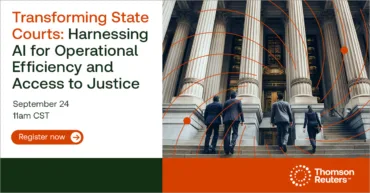What are ARPA funds?
In response to the wide-ranging impacts of the COVID-19 pandemic, the US Government passed the American Rescue Plan Act (ARPA). As part of this, the government introduced The Coronavirus State and Local Fiscal Recovery Funds (SLFRF) program. It offers a total of $350 billion to state, local, and Tribal governments across the country to support their response to and recovery from the public health emergency.
This money – known as “ARPA funds” – supports a huge number of initiatives and is available to many businesses, institutions and departments. Including yours.
Many are unaware that these funds are available to them. This on-demand webcast, “How to Modernize Your Government Legal Departments with ARPA Funds” features a discussion of these funds and solutions you can invest in.
What can ARPA funds be used for?
ARPA funds are administered by the U.S. Department of Treasury. Final rules became effective on April 1, 2022. The expanded four statutory categories for allowable usage of the funds are:
- Replace lost public sector revenue: using this funding to provide government services up to the amount of revenue lost due to the pandemic
- Respond to the far-reaching public health and negative economic impacts of the pandemic: supporting the health of communities, and helping households, small businesses, impacted industries, nonprofits, and the public sector recover from economic impacts
- Provide premium pay for essential workers: offering additional support to those who have and will bear the greatest health risks because of their service in critical sectors
- Invest in water, sewer, and broadband infrastructure: making necessary investments to improve access to clean drinking water, to support vital wastewater and stormwater infrastructure, and to expand affordable access to broadband internet
Source – U.S. Department of Treasury Coronavirus State and Local Fiscal Recovery Funds
Categories 1 & 2 cover a lot of area in your legal department. Let’s take a step back and think about some of the challenges you may be experiencing and how these funds can help.
Legal department challenges
A recent study among government legal departments conducted by Thomson Reuters revealed that within government legal departments, 64% ranked recruiting new talent as their biggest challenge.
How do you attract that new talent? A recent American Bar Association study offers a clue. This study found that young lawyers feel so strongly about remote work that 44% of them say they would leave their current jobs for a greater ability to work remotely elsewhere.
It’s critical that you can offer this flexibility to your legal talent. However, it will require an organizational willingness, the structure to make remote working possible, and of course, your technology.
Remote working technology doesn’t just mean videoconferencing. It also means being able to access and collaborate on case files with the same availability, speed, security and convenience as you have in the office, but wherever your employees choose to work from.
Other government trends discussed in the webcast:
- 75% anticipate increased workloads in the next two years
- 83% reported flat or decreased budgets in last two years
- 23% of government legal departments are highly confident they have the necessary tools or technology to do their job effectively.
New technology is a solution that can solve many legal department challenges – and is an obvious candidate for investing ARPA funds.
A legal technology solution for your legal department
HighQ is a cloud-based solution specifically designed for legal professionals. It’s been created to meet the most pressing needs of the wider legal sector’s stakeholders – and has proven its value for thousands of lawyers.
HighQ makes it easier to handle many legal processes and tasks including litigation matters, general matters, contracts, and more.
- Legal request intake and matter management
HighQ can automate and streamline the matter intake process and ensure your information is organized in one central repository so you can capture everything that comes through your legal department with full visibility.
- Document management
With HighQ, your documents are in a secure, single location that you can easily search and retrieve anywhere. Audit and version history provides full transparency into who has been working on a document and when.
- Public records and FOIA requests
HighQ uses automated workflows to make these requests simple and efficient. Using a public-facing intake form, HighQ automatically sends the information to the right location and notifies relevant parties. It automatically creates folders for collaboration, and redacts confidential information when documents are ready to be produced.
- Document automation
Government agencies frequently draft the same agreements, policies, or notices over and over. This is inefficient and vulnerable to human error. HighQ document automation provides a faster and more consistent way of drafting and completing documents in minutes, not hours.
A strong case for investing ARPA funds
Modernizing your technology tools can help you deliver services more effectively, help attract new hires and keep your existing employees happy in their roles.
Legal technology can also address some of the biggest issues that government legal departments face post-pandemic. Legitimate and stated uses for ARPA funding include:
- Addressing COVID-related court backlogs
- Providing worker retention incentives, and paying for ancillary administrative costs related to hiring, support, and retention.
HighQ delivers on all these fronts and will instantly modernize your department with efficient processes that serve the public better and equip your professionals with time-saving tools that reduce workload and increase accuracy.
At a time when budgets are stagnant or have even been cut, ARPA funding is a lifeline for legal departments struggling to get on top of their workloads. So now is the time to invest in modern legal technology.
The deadline to obligate funds is December 31, 2024, and funds must be spent by December 31, 2026.
For more on using ARPA funds for your legal department, watch our free on-demand webcast, “How to Modernize Your Government Legal Departments with ARPA Funds.”










